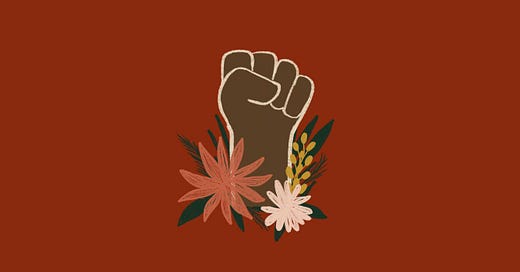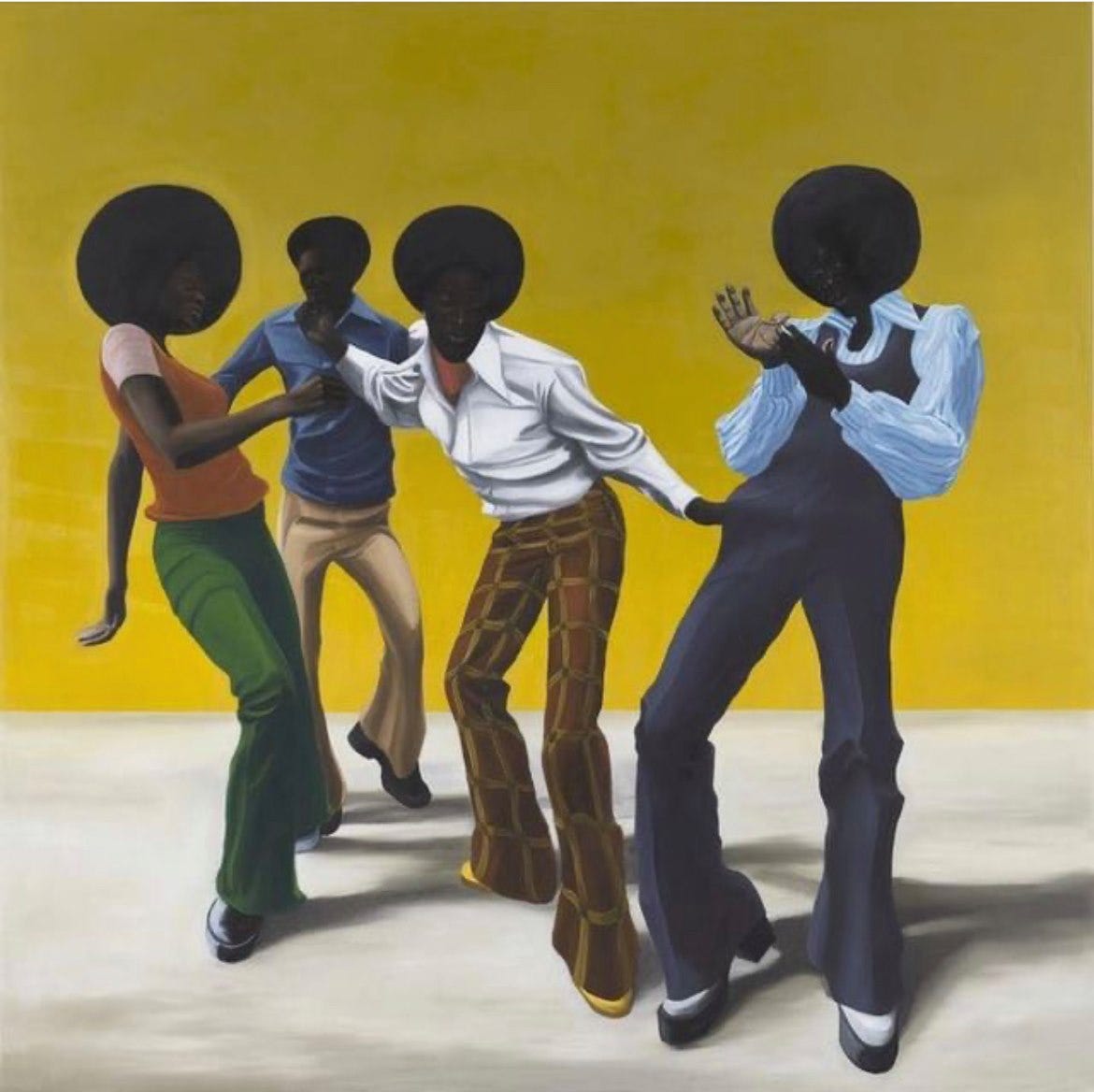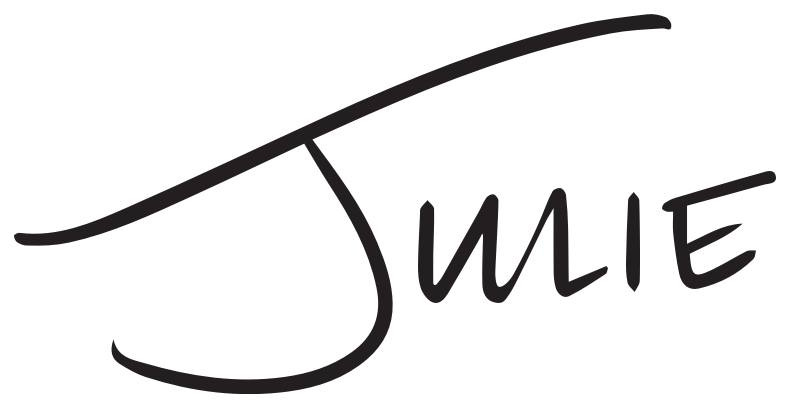It is Christmas Eve 1974 and I am seven. My older half-siblings are home for the holiday. While we wait for dinner, the four of them casually stand around the living room, smooth and colorful in their bell-bottomed polyester pantsuits, and with their perfectly round enormous afros they are as beautiful and ethereal as dandelions.
Three of them were in college and the fourth was in high school when I was born. Now as twentysomethings they are strewn across the U.S. seeking their fortune, and Christmas brings them back to the New York home of our father and his second wife (my mother). They quickly fall into a sibling routine that I, as an only child, find mysterious, alluring, and intoxicating. I loiter nearby.
Laughter explodes into the room as they talk smack with each other, jive, and play the dozens. Big new words slide out of their jubilant mouths. Their personalities take on dimension, so it's like eight people are doing an intimate and familiar dance with each other in the big living room. Their bodies double over as they slap their thighs and crackle with glee. Occasionally one darts an eye and a smile over to me, this new thing, this product of Daddy’s second marriage, fuzzy-headed from biraciality. I glance at them then look away, take a step toward them but quickly retreat to the back of the couch. I’m like a brand-new puppy that wants to join an older set of dogs but doesn’t know how.
“I’m Father Damien!” my brother Adeyemi blurts out, his declaration met with nods of approval from the rest. My sister Ngina declares, “I’m Sister Sara!” More laughter. Then Adeyemi looks over at me and says, “Julie, what’s your nickname?” Without so much as a pause, I close my eyes, gently nod my head from side to side, and say “Bridge Over Troubled Water.” Praise immediately comes my way. “Hea-VY!” “All right, sister!” “C’mere!” As they draw me in, rub my head, and hug me tight, I feel a deep belonging that I will yearn to feel for the rest of my life.
The painting "Vibe" by Nigerian artist Peter Uka © 2021 is similar to this childhood memory.
_____
In her memoir Bone Black: Memories of Girlhood, bell hooks writes in the voice of herself as a child: "Only grown-ups think that the things children say come out of nowhere. We know they come from the deepest parts of ourselves."
I mean it’s not like I invented the phrase 'bridge over troubled water.' Simon & Garfunkel released a song and album by that name in 1970 and here in 1974 it is in regular rotation on my parents’ eight-track tape deck along with Roberta Flack, The Beatles, and Earth Wind and Fire. But you don’t expect a seven-year-old to respond like that. Then again, I was not your typical seven-year-old.
In the deepest parts of my seven-year-old self I already knew from the looks of strangers on the street that something was wrong with my Black Daddy and also with me. I already knew that Black and White were at odds with one another. I already knew that a family with one parent Black and one White was problematic. And also, I knew that no one in my family looked like me. Not my White mother. Not my Black father. Not my half-siblings. There was nobody, not even a single friend or teacher, whom I resembled. I was alone in my differences in a time when to be mixed-race was to be a strange and curious thing, indeed. I was only seven. But I already knew that my existence transgressed the rules of society. That although I had done hardly anything by way of living, I was already suspect. Maybe even out of bounds.
So, when I listened to Art Garfunkel sing the plaintive lyrics of Bridge Over Troubled Water he spoke to those deepest parts of me. In the video of Simon & Garfunkel's famous Central Park reunion concert on September 19, 1981 (forty years from this coming Sunday!), look how Art darts his eyes around at the audience as if he is shy or insecure, as if he is hoping to be what they need. See how he pulls his mouth, stretching his lips around the meaning of his words, in order to get them out or make them count:
When times get rough
And friends just can't be found
Like a bridge over troubled water
I will lay me down
"I will lay me down" is quite the phrase, wouldn't you say? In my family we aren't religious, so I didn't have the familiar Christian prayer "Now I lay me down to sleep..." in my head when as a seven year old I called myself a 'bridge over troubled water.' But even so, I could tell that those lyrics in particular were an unusual construct, a sacrifice, a gift that I knew to be profound. To me, it felt like Art Garfunkel knew my pain and wanted to help me out. I mean, even at the tender age of seven I knew better than to think that he was literally speaking to me. But in speaking these words of wisdom he made the feelings I was feeling matter. And because the song was so popular with grownups, I knew there must be a universality to my feelings.
_____
I lived and explored the meaning of my problematic existence in my childhood, teens, young adulthood, and adulthood. Along the way, I would fret and stumble. And whenever I encountered others who were struggling I would try to pull them along–or, I guess, lay me down for them. I became that person others would tale their tale to. I stood with the misunderstood and accused. Sometimes all I did was remain present and hold their hand. I didn't do it all the time–I'm not trying to portray myself as some saint–just, if I could be there for them, I surely would.
I want Julie's Pod to be a space where who YOU are is okay–a place for you to feel held. Today I'm here to ask: like me, were you ever considered problematic because of who you are, how you are, what you've done, or the identities you carry? If someone could hold YOU by the hand right now, if someone could lay themselves down for YOU, would you want that? And what would you want it to be about?
Please comment below on what things have been like and where you are on your journey in this regard. (If you're reading this in your email inbox please click back out to Julie's Pod to leave a comment, that way you can be in convo not just with me but with other folk.) Also, if you're not comfortable sharing your thoughts publicly (which is completely understandable), you can leave your thoughts on my confidential voicemail 1-877-HI-JULIE and I will aggregate your thoughts with those of others and share out in a Facebook Live (keeping your identity confidential of course)! I just did my first such share on 9/13 and you can watch it here to get a feel for what that is like.
I'll leave you with the last verse from Bridge Over Troubled Water:
Sail on, silver girl
Sail on by
Your time has come to shine
All your dreams are on their way
See how they shine
Oh if you need a friend
I'm sailing right behind...
And, here's a special thanks to Simon & Garfunkel and bell hooks and Peter Uka and all of the artists who tell us that who we are is enough.
_____
For more on me, check out my website and find me on social @jlythcotthaims
*Disclaimer: I am not a physician, psychologist, or counselor, nor am I licensed to offer therapy or medical advice of any kind. What you get from me is a fellow human with a lot of thoughts and opinions based solely on my lived experience. Please call 911 or the National Suicide Prevention Line (800-273-8255) if you are having an emergency or are in crisis.
Cover graphic by @clariceapple
© 2021 Love Over Time LLC All Rights Reserved






